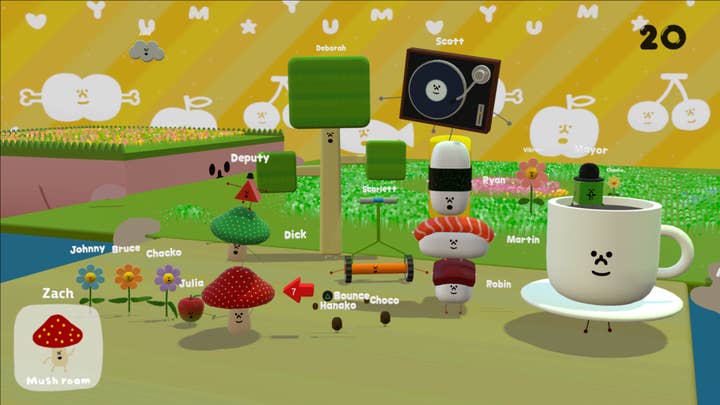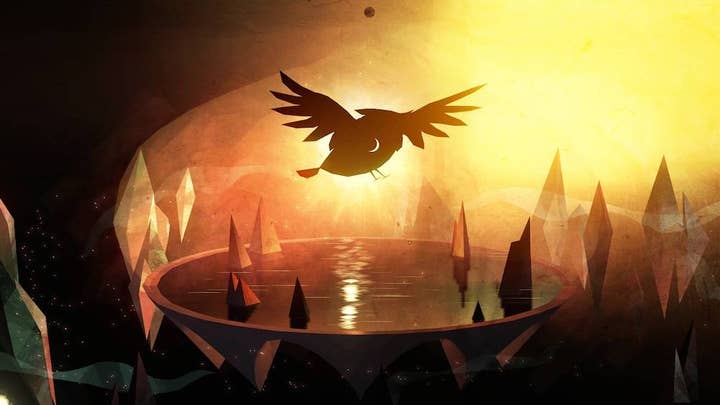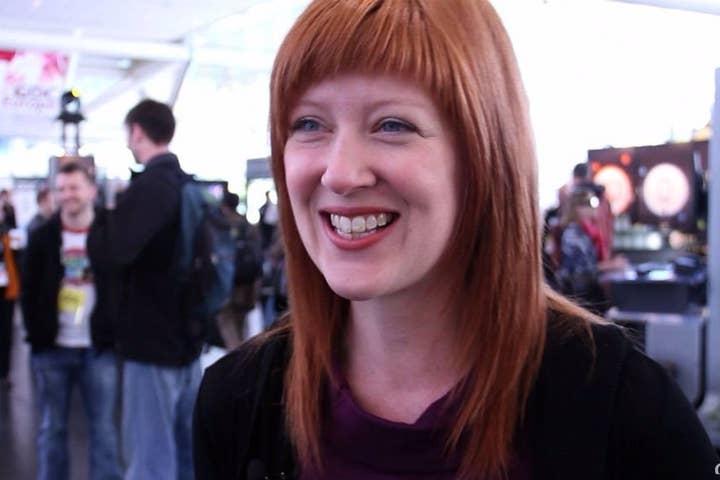"Is there a space in games for the deliberately developmental game company?"
Robin Hunicke and Funomena are trying to find out, making experimental games without a 100% focus on profitability
It's hard to think of a time in videogame history at which the future has seemed so unclear. New technologies, including Vive, Oculus, Hololens and Magic Leap, backed by some of the biggest corporations in the world, seem poised to transform the very nature of digital enabled play, and yet it's difficult to envisage exactly how, and what the gaming landscape is going to look like, even in just five years' time.
Funomena is an independent studio that's taking creative steps to map out and make sense of this great unknown continent. Founded in January 2013 by Robin Hunicke and fellow thatgamecompany alumnus Martin Middleton, the downtown San Francisco-based team is now 20 employees strong and has enjoyed the backing of Google, Intel, Lenovo and more to imagine, prototype and release games using their technologies.
"In the next 20 years, what will be fun to do in the real world, with real people who you love and care for, and how should digital mediated experiences support and augment that?"
First was Terra, a browser game for classrooms developed with the National Science Foundation and UC Davis in which players terraform a planet using resources gleaned from Fitbit-powered pedometer data. "I think it set in motion a series of understandings for us as a company that you can work with people out there in these incremental ways," says Hunicke. "Over time, that knowledge became intuition about embodiment and about what is fun to do in the real world, and then have feedback in a virtual or simulated world. I think that's the question that we are asking ourselves now: in the next 20 years, what will be fun to do in the real world, with real people who you love and care for, and how should digital mediated experiences support and augment that?"
Now, Funomena is working on three games: Luna, a PC VR storybook game inspired by origami, stop-animation and sculpture; Woorld, a handheld sandbox AR game for Google's Tango; and Wattam, a console title being designed with Keita Takahashi, the creator of Katamari Damacy. Funomena's team works from a single room, plus two conference rooms, one of which doubles as Hunicke's office. "We currently have a pool table, which we'll probably get rid of soon because we want to get another lunch table. There's not enough space around the lunch table for everyone to eat at once."
It's rare for a relatively new independent studio to attempt to stretch 20 people over three creatively ambitious projects, but for Hunicke, independence and creativity is the very reason why Funomena is doing so. "We realised that if we had more than one project going we would have the interplay of ideas between the projects, and more of a chance to get something out of the door before crumbling into the ground, which is often the fate of independent game studios, right?"

Building a sustainable business lies at the studio's centre, after all, right from the first conversations that Hunicke and Middleton had about what their venture would be. "We said, 'Let's make stuff that makes us feel excited,'" Hunicke says, and what they find exciting is, "Research, hard problems, and pushing the medium forward. We wanted to build a company making experimental games but in a sustainable way, not necessarily focused 100% on profitability."
Sustainability for Funomena means building a varied team. Members come from different scales of company, some from AAA, some from mobile. Some prototyped, others worked various engineering roles and found that games are the most rewarding area for them. "So we don't necessarily just hire people who started off in indie games and stayed there." That the studio lunch table needs to be enlarged reflects a commitment to these people, as does the recent hire of a studio director, Lulu LaMer, who Hunicke first met when she was working at Looking Glass on System Shock and has given the core role of managing HR. "It sounds weird to say we need HR, being tiny, but I really wanted the company to be a deliberately developmental organisation where people can bring their true selves to work," Hunicke says. It's an attempt to avoid some of the pitfalls that come from working at a small startup, of everyone being spread thin and overworking, and founders losing sight of the importance of the development process.
"We wanted to build a company making experimental games but in a sustainable way, not necessarily focused 100% on profitability"
"As long as we could sustain around 20 people, which is where we want to top out, and we could show that we were capable of making creative projects happen in reasonable time with high quality, that would either bring the right people to us in terms of relationships and funding and support, or it wouldn't. And that's the question: is there a space in games for the deliberately developmental game company, for an organisation that focuses on building things that make us feel joy, so we can share them with others? It's still an unknown."
She describes the current experience of working Funomena as rowing every day to a distant shore that is only just coming into sight. But that, one supposes, is the very nature of coming at design from the standpoint of conducting wide-ranging research. Hunicke's current focus is Luna, which is VR-based now but was originally designed for an Intel gestural camera. Hunicke says that being able to switch the project's core technologies comparatively easily was a direct result of it being underpinned by such a large body of research. For Luna, that was a combination of 2D prints, animation and origami (inspired by a year-long obsession Hunicke had after leaving thatgamecompany in 2012, during which she also worked on Tiny Speck, the game that latterly became the messaging service Slack). Most importantly, the team looked at sculpture, which made them think about their project in terms of its physical manifestation.
This focus is an illustration of one of the ways that Funomena works differently to many other game studios. So many seem to come at the challenge of designing for VR from the perspective of 'wouldn't it be cool if', and then have to butt their heads against having to realise it. But Funomena tends to look at what exists in the world already. "We understand that for thousands of years humans have made physical objects and physical games, have played in the physical world, and imagined and created in ways that are determined by our embodied presence and experiences of those things," Hunicke says. "I appreciate the form of objects, and I love to see sculpture in museums particularly, because I feel sculpture is a very expressive and dynamic form of art, and it has so much to do with your presence in space around it. Years ago now, when I first saw the first experiments in VR at Valve, I was immediately drawn to them, thinking of all the things we could build in this space, the ways you can play with scale, transport you to different types of environments, and the ways that things can be surreal and not real, and at the same time very present, in the same way a sculpture is."

Hunicke likens the effect of VR to the experience of encountering Anish Kapoor sculptures, the way they play with scale, how light bends on reflective objects, or the way pigment absorbs light. "He has such a profound understanding of the physical and the way that the eye and the heart interact with the mind when you're in that space. To me, you're putting someone in an environment in which you get to control all of the things people experience. It's not all like you're looking at a screen and you're on your couch and your pet's there and your drink is there, and the sirens are outside the window. When you're in VR you're completely immersed in a way that's so compelling."
"Anyone who's taking steps forward in VR now...is gathering really important intuition about the boundaries of that space and the ways in which our expectations can be shattered and reformed"
Engaging with a wider world of human design and creation is therefore a far better way of exploring this new field than to bring existing videogame conventions into it, especially as Hunicke feels VR and AR are so different to the traditional videogame. "To me the most important thing to understand is how VR and AR connect people together," she says. Endowed with a powerful sense of presence and unconstrained by physical reality, she believes in their potential to present new ways for people to negotiate issues of identity, such as gender and physical appearance. "It means we can do away with a lot of the binaries and constraints that we are presented with when we go down the street," she says, drawing a parallel with one of Journey's most affecting features: its multiplayer. "Because you can't speak or type to other players, your interactions are softened, and because when you interact with them the results are generally positive, your heart is softened, and when you get to the end you see it was a real person and your mind is kind of blown."
Naturally, all these powers can also lead to less than positive consequences, something of which Hunicke is more than aware. "It's a huge responsibility, and anyone who's taking steps forward now to investigate when the market, the audience and the formats are still uncertain, is gathering really important intuition about the boundaries of that space and the ways in which our expectations can be shattered and reformed. As long as we collaborate and are honest with ourselves about the kinds of experiences we wish to see in the world, and the kinds of people we wish to be in the world, we can really make some groundbreaking discoveries in socialisation, community building, shared experiences, empathy and creativity in that context. That's definitely where we should be headed."
Robin Hunicke is delivering the Indie Keynote at Develop on Wednesday, July 14, titled Funomenal Feel Engineering, in which she'll explore how she and her team blend art, technology and design through 'feel engineering'.

